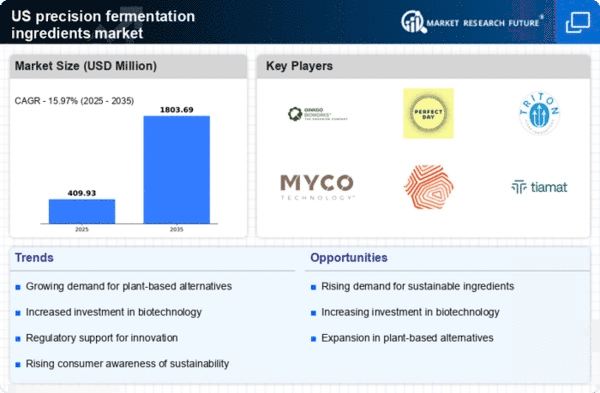Regulatory Support and Innovation
The precision fermentation-ingredients market is bolstered by favorable regulatory frameworks that encourage innovation in food technology. The US government has been actively promoting research and development in biotechnology, which includes precision fermentation. Initiatives aimed at enhancing food security and sustainability have led to increased funding and support for companies engaged in this sector. For instance, the USDA has allocated millions in grants to support innovative food technologies. This regulatory backing not only fosters a conducive environment for startups and established firms but also accelerates the commercialization of precision fermentation products. As a result, the market is likely to witness a proliferation of novel ingredients that meet consumer demands for health, sustainability, and quality.
Consumer Awareness of Health Benefits
Consumer awareness regarding the health benefits of precision fermentation-derived ingredients is significantly influencing the market. As individuals become more informed about nutrition and the impact of food choices on health, there is a growing interest in functional ingredients produced through precision fermentation. These ingredients often boast enhanced nutritional profiles, including higher protein content and lower levels of harmful additives. Market Research Future indicates that approximately 60% of consumers in the US are willing to pay a premium for products that offer health benefits. This trend is prompting manufacturers to incorporate precision fermentation ingredients into their products, thereby driving growth in the market. The increasing focus on health and wellness is likely to sustain demand for these innovative ingredients.
Increased Investment in Biotechnology
Investment in biotechnology is a critical driver for the precision fermentation-ingredients market, as venture capital and private equity firms increasingly recognize the potential of this sector. In recent years, investments in food tech startups have surged, with estimates suggesting that funding reached over $5 billion in 2023 alone. This influx of capital is facilitating the development of innovative fermentation processes and the scaling of production capabilities. Investors are particularly interested in companies that utilize precision fermentation to create sustainable ingredients, which aligns with broader trends in consumer preferences. As financial backing continues to grow, the precision fermentation-ingredients market is expected to expand, leading to enhanced product offerings and improved market competitiveness.
Rising Demand for Alternative Proteins
The precision fermentation-ingredients market is experiencing a notable surge in demand for alternative proteins, driven by shifting consumer preferences towards plant-based diets. This trend is largely influenced by health consciousness and environmental concerns. According to recent data, the alternative protein market in the US is projected to reach approximately $10 billion by 2025, indicating a robust growth trajectory. As consumers increasingly seek sustainable and ethical food sources, precision fermentation technologies are being leveraged to produce high-quality protein ingredients that mimic traditional animal products. This shift not only caters to the growing vegetarian and vegan populations but also appeals to flexitarians who are reducing meat consumption. Consequently, the precision fermentation-ingredients market is positioned to benefit significantly from this evolving dietary landscape.
Sustainability and Environmental Impact
The precision fermentation-ingredients market is increasingly driven by concerns over sustainability and environmental impact. As consumers and businesses alike prioritize eco-friendly practices, the demand for ingredients produced through precision fermentation is rising. This method is known for its lower resource consumption compared to traditional agriculture, requiring less land and water while producing fewer greenhouse gas emissions. Reports suggest that precision fermentation can reduce the carbon footprint of food production by up to 50%. As sustainability becomes a key purchasing criterion, companies are adopting precision fermentation technologies to align with consumer values. This shift not only enhances brand reputation but also positions the precision fermentation-ingredients market as a leader in the transition towards a more sustainable food system.
















